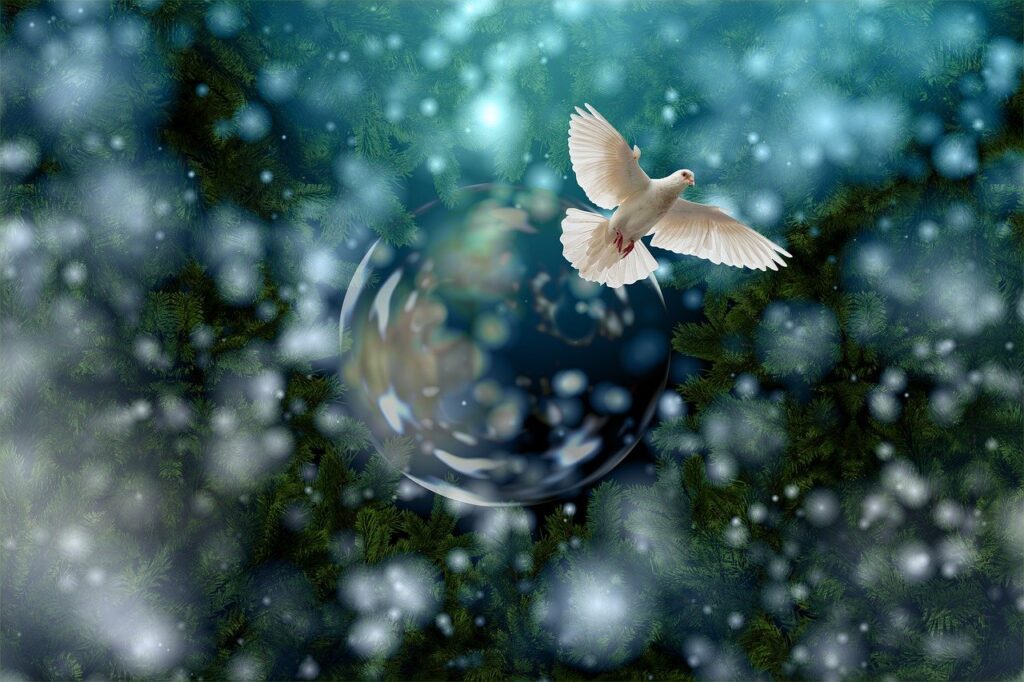The second week in Advent is upon us. Looking around the world – near and far – peace seems beyond our reach. The truth is, in the proverbial big picture, peace has always been beyond humanity’s reach. There has never been a time in global history without war and violence. This is why the Bible is filled with promises of peace, and repetitions of God’s steadfast love for the whole of Creation. Left to our own devices, we will not find peace of mind, body, or spirit. Humanity, on its own, will not create global peace. There is too much in us that loves kyriarchy and thrives on divisive fear. Yet, God constantly calls us to a holy way, a way where the valleys are lifted up and the mountains are made low, a way where love and justice prevail.
Advent is the perfect time to remember that there is a holy way to be found. We can slow down, take a deep breath, and look for those places or moments where we are reminded of God’s presence and actions in the world. We can lift our heads and remember that there is more in the world than pandemic, grief, mass shootings, divisive politics, White supremacy, and all that weighs on us, steals our hope, and moves peace beyond our reach. God has not abandoned humanity. God waits with the same steadfast love offered to our ancestors in faith. The promises spoken through the ancient prophets, are promises for us to grab hold of, breathe in, and embody.
When Baruch invited Jerusalem to “take off the garment of your sorrow and affliction… and put on forever the beauty of the glory of God,” the invitation extends to all who seek to live on the holy highway. We can make the decision to be defined by something other than sorrow and affliction. This doesn’t mean that we deny the sources of suffering or pretend that oppression doesn’t exist; it means that we actively pursue more than what is. We stop excusing the fear and hatred spewed by politicians and look for ways to repair what is broken, tangible ways to end oppression with actions that promote justice. Putting on the beauty of God’s glory means that we also recognize God in every human being. If we can do this, we will not tolerate excuses that keep violence an acceptable part of our society.
Along with the garments of God’s glory, we may also choose to wear the robe of righteousness. Note, this is not self-righteousness. God’s righteousness is revealed in God’s steadfast love. If we claim righteousness, then we must ask if God’s steadfast love is revealed in our words and actions; we cannot be passive in a society unable to end its abusive love affair with White supremacy and violence. God’s righteousness does not tolerate hatred and the systemic abuses of peoples who are not White, heterosexual, cis gender (preferably male), able-bodied, and wealthy. Not one of us can claim any degree of righteousness while there is violence, division, hunger, homelessness, and inequitable access to necessary resources. These are things that can change with our actions, with our votes, with our raising up of unheard voices. Let’s keep reaching for that robe of righteousness so that one day everyone will be equally clothed.
In spite of all that is desperately hard in the world today, I whole-heartedly believe that God seeks to lead us all with joy and mercy. The light of God’s glory shines through the despair and ugliness that human fears have created. Much of what causes suffering in the world today has been created by human action or inaction – global warming, White supremacy, war, violence, oppression of all kinds, divisive fear, etc. If the generations who came before us built the conditions that divide us from one another and keep us from more fully living in God’s holy ways, then it is up to us to repair what is broken. We do not do this alone.
Reparations, repairing what is broken, requires a recognition of the interdependence that weaves us together with the power of the Holy Spirit. This is the long way of saying that in order to bring the Realm of God into the hear and now, we must recognize Christ in ALL of our neighbors and treat each other accordingly. We also must see the planet as a sacred gift and stop abusing her resources so that she can heal and there is enough sustenance left for generations to come.
Peace is possible when we actively pursue more than what is, when we reach for and embody the Kingdom of God right here, right now. No more excuses. Isn’t it time we actually trust God’s steadfast love for the us and for the whole of Creation?
RCL – Year C – Advent 2 – December 5, 2021 – Baruch 5:1-9 or Malachi 3:1-4 • Luke 1:68-79 • Philippians 1:3-11 • Luke 3:1-6

